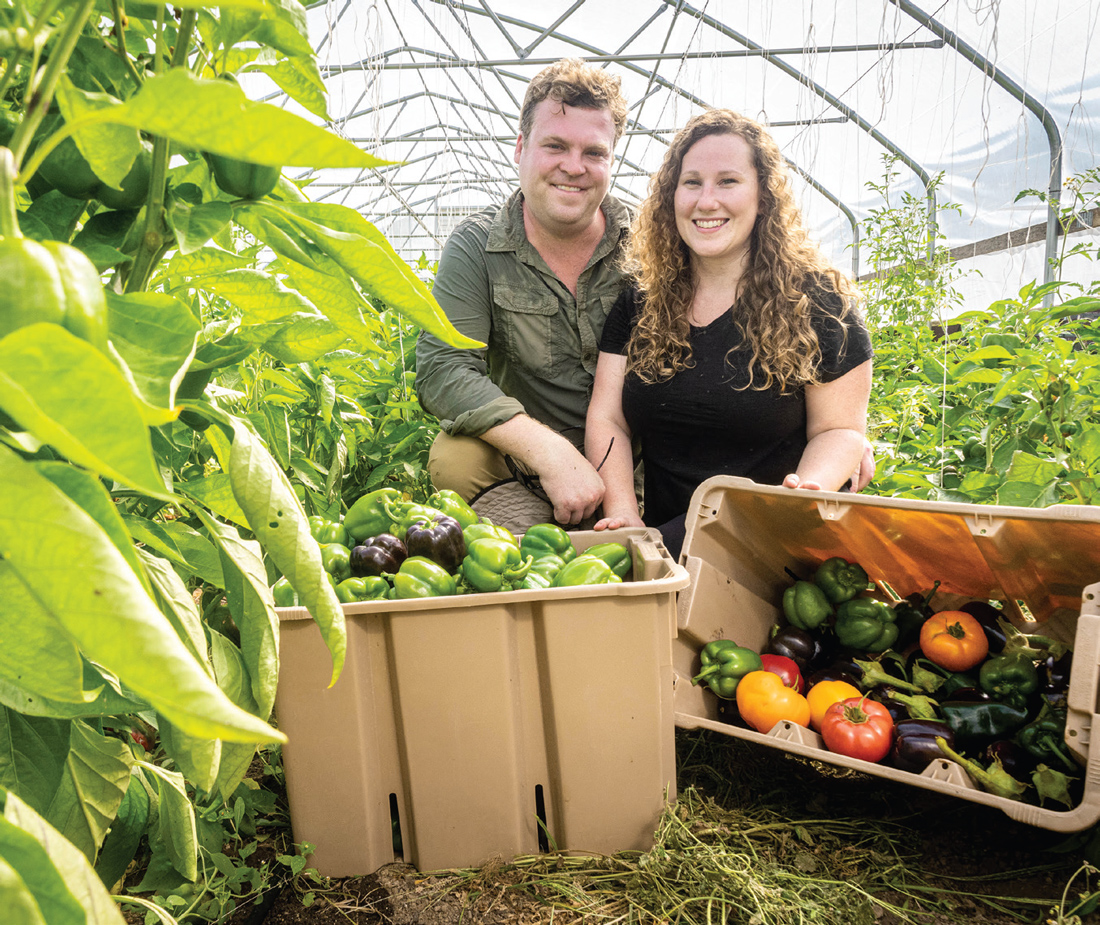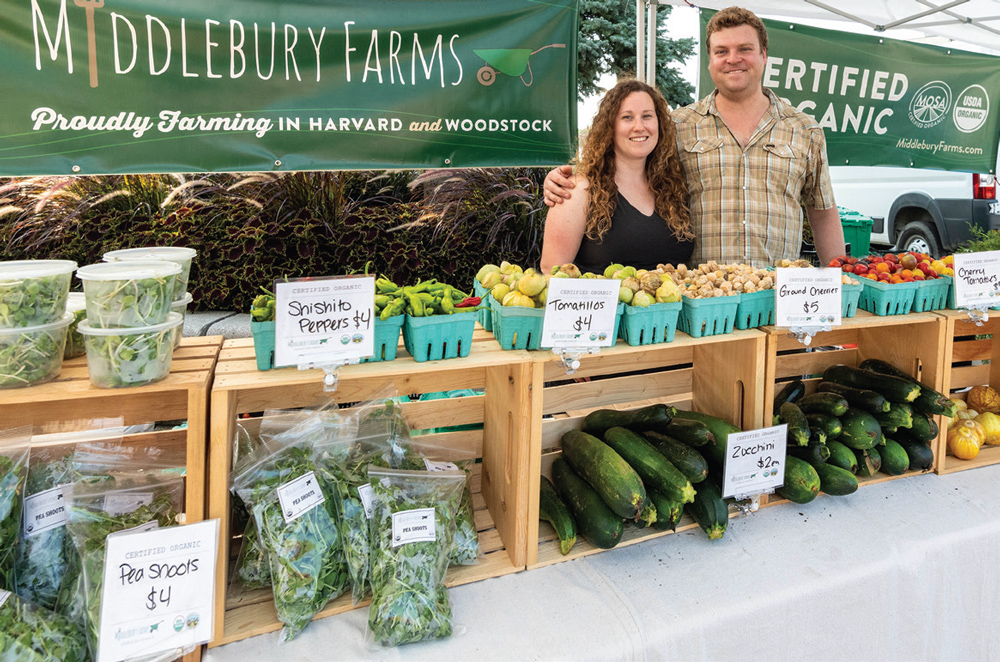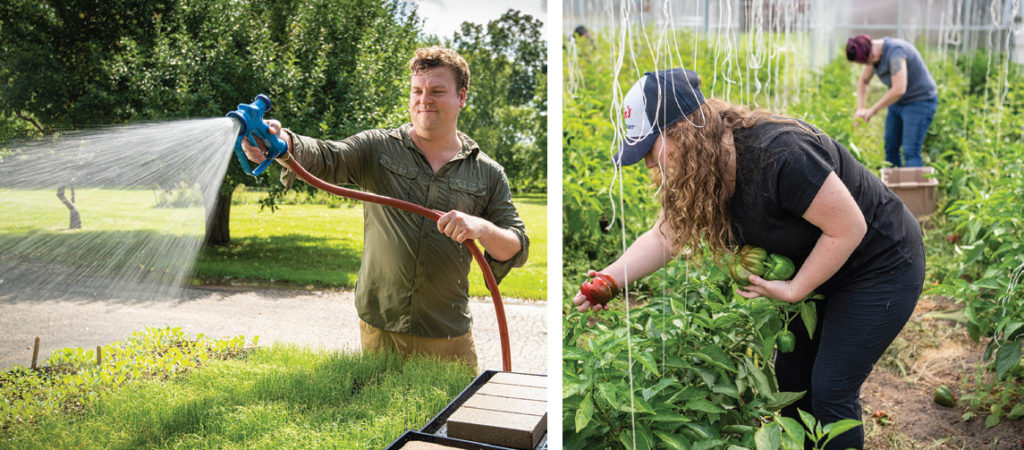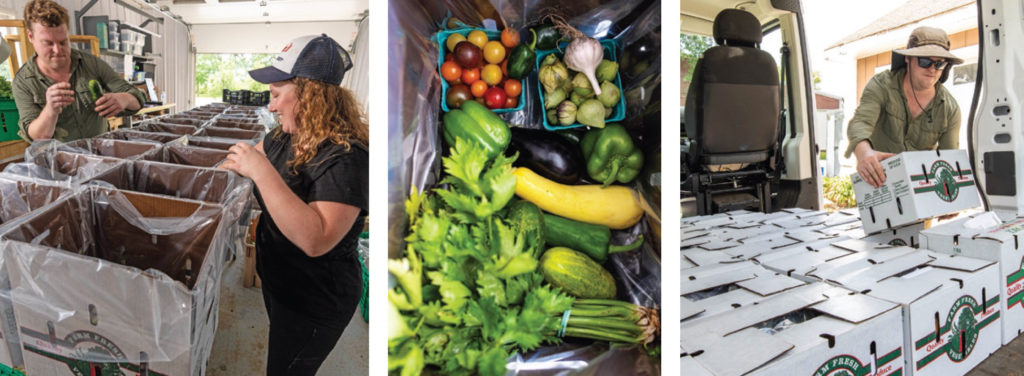

First generation farmer Peter Grubbe found his passion for farming when his family moved from Cary to Barrington Hills. They first arrived when he was age 1, in 1989, when they moved to McHenry County on the north side of Barrington Hills. Then his parents moved when he was in the 6th grade to a more rural part of Barrington Hills. The previous home’s owner had left behind a one-acre garden on higher land with a deer fence, as well as irrigation. That was the catalyst for Grubbe’s career in farming.
His love of the outdoors, and influence from a father who worked in conservation, led to learning how to farm in his teenage years. His goal was to run an organic farm. He learned early on that first year that people, and restaurant owners of D&J Bistro, were interested in buying his produce. It became his summer job until age 21. During those years, Grubbe developed his brand with the name “Middlebury Farms,” and it stuck. The name Middlebury name came from the original name of a village that was the precursor to Barrington Hills, named after Middlebury, Vermont. Middlebury was annexed to the Village of Barrington Hills in 1963.
Grubbe had a small tractor, but most of the work was done manually. The goal he desired was for organic certification, with higher standards that he could assure his customers of. “Our farm was certified in 2008. We grew heirloom tomatoes, baby lettuce mixes, zucchinis, kale, Swiss chard—all vegetables,” Grubbe said.
Grubbe attended Countryside Elementary and Prairie Middle School before attending Saint Viator High School. He attended Purdue University to study agricultural economics, but his farm kept him so busy he decided to focus solely on the job and he returned home for good. He maxed out his one-acre farm in Barrington Hills, and bought property in Harvard in 2011 to expand his land to 20 acres—most of which are farmed by tractor.
Elizabeth Spiewak grew up in Cary, and as an adult, realizes now that she is fond of McHenry County and its communities. She attended Cary-Grove High School and is a Northern Illinois University graduate who studied communications. After a brief time living in Chicago, she moved back home and became an event planner, pre-pandemic, at the Dole Mansion in Crystal Lake. “Peter and I met at the Cary farmer’s market and reconnected in 2019,” Spiewak said. She offered to help him with his business. Middlebury Farms has grown through their teamwork, and the two are engaged to be married in March 2023. Their similar backgrounds gave them a strong foundation for working together and building their lives as farmers.

In 2020, Middlebury Farms’ Community Supported Agriculture (CSA) business tripled. Spiewak lent her marketing skills to the business, and the pandemic also had an impact. “People were scared about where their food was coming from. We could guarantee that they would have vegetables delivered to their homes, and local farmers markets,” she said.
The couple grows about 40 different kinds of produce. Carrots, cucumbers, and heirloom cherry tomatoes top the most popular list, and golden beets and shishito peppers are less known to their customers. They sell produce to local restaurants including Duke’s Alehouse and Kitchen, 1776 Restaurant, the Crystal Lake Country Club, and the Lake Geneva Hunt Club.
Middlebury Farms is certified organic by the USDA through one of its regional agents. No chemicals are used at their farm. They plant certified organic seeds and use certified organic amendments such as [approved] compost. The team grows cover crops, like oats or buckwheat, that creates nutrition for the soil naturally. It’s plowed over or the winter deconstructs it, creating fresh soil. Acres are either planted, or committed to crop covers each year. “We have to keep strict records on our fields for our rotation,” Spiewak said. “We are audited on one vegetable each year—and the auditors want to know every detail on the crop’s history. Our seeds are all non-GMO.”
The farming lifestyle is not for the 40-hour-per-week crowd. “In the summer, we work seven days a week, from sunrise to sunset,” Spiewak says. And there are inherent risks in the business, such as weather, insects, and the financials. But there is also a marvelous upside. In addition to growing clean food for a local economy, Grubbe and Spiewak live off the land in the countryside.
“When it’s time for dinner, we go outside and pick whatever we want to eat,” Grubbe says. And his fiancé loves to cook. “We eat what we grow and live with the seasons.”
As they look ahead to their wedding, marriage, and agricultural lifestyle, they join a much larger community. The State of Illinois’ 26.7 million acres of farmed land is cared for by those running 72,200 farms. The Prairie State’s farmers add 19 billion dollars to the economy and represent a major industry. Isn’t it wonderful to learn the story of Middlebury Farms as one of our newest farm enterprises, and how much its owners care about the land and producing clean food for others to enjoy?

Peter Grubbe and Elizabeth Spiewak began Middlebury Farms with a reliance on farmer’s markets and a Community Supported Agriculture (CSA) program for the distribution of their certified organic produce to consumers. Like all businesses, farming requires a production and marketing model—and with a CSA—consumers participate in the business directly. CSA members pay an agreed-upon amount, in a lump sum or installments, in advance of the growing season. (Middlebury Farms’ CSA program is accepting members until early May this year.) This pre-payment creates a planning and financial base for how Grubbe and Spiewak will assign crops to their acreage and offers a downpayment towards their initial seasonal start-up costs.
CSAs began in the United States in 1986, with the impulse coming from Europe’s biodynamic agriculture tradition. Both Indian Line Farm in Massachusetts and Temple-Wilton Community Farm in New Hampshire, the two original CSA farms, were still thriving as of 2004. The concept defining the first American CSAs was to develop an economy where you produce locally what is consumed locally.
Middlebury Farms’ CSA program runs from June through late October. The produce boxes are delivered to a member’s front door unless other arrangements are made for pick-up. They participate along with 1,700 other small farms across every region in the U.S., producing clean, organic food with a very low carbon footprint from the 30-mile CSA box delivery trip between Harvard and Barrington.
Their USDA-Certified Organic produce delivers a vegetable mix each week that changes across the growing seasons. Members can choose from a full share with a box delivered once per week (for 18 weeks) or choose a box every other week. Middlebury Farms CSA boxes will also contain recipes, news from the farm, and invites to member events. Spiewak loves the fresh, roasted beets with goat cheese salad recipe, as well as the blistered shishito peppers with garlic aioli sauce. The couple also enjoys the winter acorn and butternut squash.
The early spring boxes typically contain sugar snap peas, radishes, spring lettuce mix, green onions, cucumbers, herbs, kohlrabi, beets, kale, fennel, green beans, and peas. Peak season is mid-July to mid-September. Boxes will include romaine lettuce, cherry tomatoes, cucumbers, zucchini, onions, carrots, garlic, bell peppers, jalapeno peppers, potatoes, sweet corn, and melons. The late season October boxes delivers crops that Spiewak says “love the cold weather.” They contain turnips, leeks, bok choy, carrots, spinach, beets, arugula, green onions, Swiss chard, kale, and Brussels sprouts.
To become a member of Middlebury Farms’ CSA program, contact them before May 1 this year to sign up. Reach by email at middleburyfarmsinc@gmail.com, or call 847-714-6249. Visit middleburyfarms.com.
Share this Story